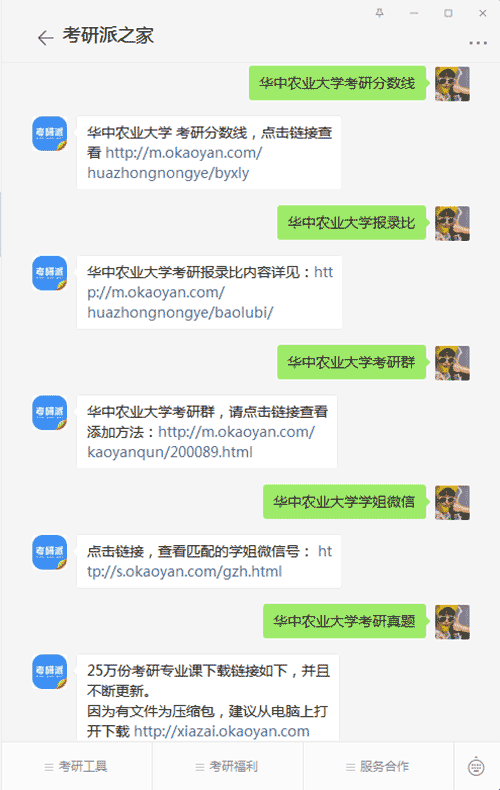
华中农业大学植物科技学院导师:彭少兵的内容如下,更多考研资讯请关注我们考研派网站的更新!敬请收藏本站。或下载我们的考研派APP和考研派微信公众号(里面有非常多的免费考研资源可以领取哦)[华中农业大学植物科技学院导师:彭少兵] [华中农业大学植物科技学院导师:黄见良] [华中农业大学植物科技学院导师:曾汉来] [华中农业大学植物科技学院导师:彭良才] [华中农业大学植物科技学院导师:刘安国] [华中农业大学植物科技学院导师:王学奎]
为你答疑,送资源

95%的同学还阅读了: [2022华中农业大学研究生招生目录] [华中农业大学研究生分数线[2013-2021]] [华中农业大学王牌专业排名] [华中农业大学考研难吗] [华中农业大学研究生院] [华中农业大学考研群] [华中农业大学研究生学费] 华中农业大学保研夏令营 华中农业大学考研调剂2022最新信息 [华中农业大学研究生辅导] [考研国家线[2006-2021]] [2022年考研时间:报名日期和考试时间]
华中农业大学植物科技学院导师:彭少兵正文
基本信息
姓名: 彭少兵 出生年月: 1962.6
性别: 男 硕/博导: 博导
民族: 汉 开设课程:
职称: 教授 研究方向: 1.作物生理学 2.作物栽培学 3.作物营养生理
学位: 作物生理学博士
联系方式
办公电话:027-87288380
电子邮件:
个人简介
彭少兵,1962年6月出生于湖北洪湖,博士,教育部2005年“长江学者奖励计划”讲座教授,博士生导师。1979~1983年就读于华中农学院农学专业,获农学学士学位,毕业后留校任教。1985-1991年,先后在美国加州大学戴维斯分校、德州理工大学和佛罗里达大学获硕士、博士学位和从事博士后研究,于1991年10月起就职于菲律宾国际水稻研究所,任高级作物生理学家。2010年12月回国,特聘为华中农业大学全职教授。
研究方向为作物高产生理与栽培管理、作物营养生理与养分管理、水稻光合作用与水分生理、全球气候变化与逆境生理。主要学术成就包括:(1)发现了夜间温度每升高1℃导致水稻减产10%,这一研究结果成为国际政府间气候变化专门委员会(IPCC)预测全球气候变化对粮食产量影响和制定对应政策的依据之一;(2)揭示了不同时期育成水稻品种的产量演替规律,提出了提高品种对非生物逆境适应性而维持产量潜力的“维持育种”理论;(3)阐明了水稻叶色值与叶片含氮量和光合作用的定量关系,这些定量关系为建立水稻实时实地氮肥管技术提供了理论依据,实地氮肥管技术使施氮量减少25%-30%、增产5%-8%,在中国和东南亚得到了大面积推广和应用,取得了显著的经济和社会效益。
先后在国内外一些有影响的学术期刊上发表论文121篇,其中为SCI收录论文90篇(第一作者或通讯作者53篇),累积影响因子为173。所发表的论文被SCI期刊引用共2051次,单篇引用最高次数达148次,SCI论文的h-指数为26。现任《Crop Science》、《Field Crops Research》、《Plant Production Science》、《作物学报》、和《植物生理与分子生物学报》编委。
1994年任“气候变化与水稻”国际学术大会主席;1996年获得国际农业磋商组织(CGIAR)颁发的“杰出青年科学家奖”;2000年任“第23届国际水稻科学大会”主席;2002年主持创建了华中农大作物生理与栽培研究中心;2003年获得韩国农村发展局“荣誉科学家”奖;2004年被美国农学会授予“会士”(Fellow of ASA);2004年在美国PNAS发表的论文“Rice yields decline with higher night temperature from global warming”被美国《探索》杂志选入“2004年度全球100项重大科学新闻”,排名第68位;2005年被美国作物学会授予“会士”(Fellow of CSSA);2005年获CGIAR颁发的“优秀论文奖”;2006年获得中国自然科学基金海外杰出青年B类资助;2008年任中国自然科学基金评审会二审专家。
发表的论文及著作
1. Peng, S., J. Huang, J.E. Sheehy, R.C. Laza, R.M. Visperas, X. Zhong, G.S. Centeno, G.S. Khush, and K.G. Cassman. 2004. Rice yields decline with higher night temperature from global warming. Proceedings of the National Academy of Sciences (USA) 101(27):9971-9975.
2. Peng, S., R.J. Buresh, J. Huang, J. Yang, Y. Zou, X. Zhong, G. Wang, and F. Zhang. 2006. Strategies for overcoming low agronomic nitrogen use efficiency in irrigated rice systems in China. Field Crops Research 96:37-47.
3. Peng, S., B.A.M. Bouman, R.M. Visperas, A.R. Castañeda, L. Nie, and H.-K. Park. 2006. Comparison between aerobic and flooded rice in the tropics: agronomic performance in an eight-season experiment. Field Crops Research 96:252-259.
4. Islam, M.S., S. Peng, R.M. Visperas, N. Ereful, M.S.U. Bhuiya, and A.W. Julfiquar. 2007. Lodging-related morphological traits of hybrid rice in a tropical irrigated ecosystem. Field Crops Research 101:240-248.
5. Yang, W., S. Peng, R.C. Laza, R.M. Visperas, and M.L. Dionisio-Sese. 2007. Grain yield and yield attributes of new plant type and hybrid rice grown under irrigated conditions. Crop Science 47:1393-1400.
6. Tang, Q., S. Peng, R.J. Buresh, Y. Zou, N.P. Castilla, T.W. Mew, and X. Zhong. 2007. Rice varietal difference in sheath blight development and its association with yield loss. Field Crops Research 102:219-227.
7. Nie, L., S. Peng, B.A.M. Bouman, J. Huang, K. Cui, R.M. Visperas, and H.-K. Park. 2007. Solophos fertilizer improved rice plant growth in aerobic soil. Journal of Integrated Field Science 4:11-16.
8. Nie, L., S. Peng, B.A.M. Bouman, J. Huang, K. Cui, R.M. Visperas, and H.-K. Park. 2007. Alleviating soil sickness caused by aerobic monocropping: Responses of aerobic rice to soil oven-heating. Plant and Soil 300:185-195.
9. Peng, S., G.S. Khush, P. Virk, Q. Tang, and Y. Zou. 2008. Progress in ideotype breeding to increase rice yield potential. Field Crops Research 108:32-38.
10. Yang, W., S. Peng, M.L. Dionisio-Sese, R.C. Laza, and R.M. Visperas. 2008. Grain filling duration, a crucial determinant of genotypic variation of grain yield in field-grown tropical irrigated rice. Field Crops Research 105:221-227.
11. Nie, L., S. Peng, B.A.M. Bouman, J. Huang, K. Cui, R.M. Visperas, and J. Xiang. 2008. Alleviating soil sickness caused by aerobic monocropping: Responses of aerobic rice to nutrient supply. Field Crops Research 107:129-136.
12. Yang, W., S. Peng, R.C. Laza, R.M. Visperas, and M.L. Dionisio-Sese. 2008. Yield gap analysis between dry and wet season rice crop grown under high-yielding management conditions. Agronomy Journal 100:1390-1395.
13. Peng, S., Q. Tang, and Y. Zou. 2009. Current status and challenges of rice production in China. Plant Production Science 12(1):3-8.
14. Nie, L., S. Peng, B.A.M. Bouman, J. Huang, K. Cui, R.M. Visperas, and J. Xiang. 2009. Alleviating soil sickness caused by aerobic monocropping: Responses of aerobic rice to various nitrogen sources. Soil Science and Plant Nutrition 55(1):150-159.
15. Ao, H., S. Peng, Y. Zou, Q. Tang, and R.M. Visperas. 2010. Reduction of unproductive tillers did not increase the grain yield of irrigated rice. Field Crops Research 116:108-115.
添加华中农业大学学姐微信,或微信搜索公众号“考研派之家”,关注【考研派之家】微信公众号,在考研派之家微信号输入【华中农业大学考研分数线、华中农业大学报录比、华中农业大学考研群、华中农业大学学姐微信、华中农业大学考研真题、华中农业大学专业目录、华中农业大学排名、华中农业大学保研、华中农业大学公众号、华中农业大学研究生招生)】即可在手机上查看相对应华中农业大学考研信息或资源。


本文来源:http://m.okaoyan.com/huazhongnongye/daoshi_503045.html
































